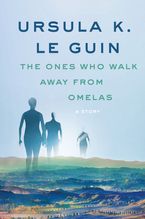

Neither Le Guin nor James, however, would necessarily applaud the members who choose to leave this community, for to do so, would not change the status of the suffering child. Some mistakenly argue that Le Guin supports the non-compliance of those who walk away. The author pits brute reality against fiction’s capacity to conjure illusory solutions and offers no easy answers. The Omalasians subscribe to a social contract contingent upon the exploitation of one child to ensure the happiness of all other citizens.

Le Guin contends that in this passage, “The dilemma of the American conscience can hardly be better stated.” In the story, a community inhabits a wonderful, fairytale world free of illness, anxiety, and social strife. “If the hypothesis were offered us of a world in which … millions kept permanently happy on the one simple condition that a certain lost soul on the far-off edge of things should lead a life of lonely torment… even though an impulse arose within us to clutch at the happiness so offered, how hideous a thing would be its enjoyment when deliberately accepted as the fruit of such a bargain?” culture at the time of the Vietnam War, inspired by the “shock of recognition” she experienced upon reading this passage from William James:

Le Guin considers the story an allegory of U.S. The tension between these two heaven-and-hell extremes could be summed up in a pull between the impulse to leave in the title and the joyous arrival of the festival that sets the stage.Ī carefree community that seems pleasing and just, turns out to be structured on injustice and ultimately untenable for some of its citizens.Įthical confusion arises both within the fictional world of the story and when the reader attempts to reconcile that textual space with the real world counterpart to which it refers. In the short story “The Ones Who Walk Away from Omelas” (Variations on a Theme by William James), Ursula Le Guin presents us with a utopia that turns out to include an imperfect, even nightmarish dystopia.


 0 kommentar(er)
0 kommentar(er)
